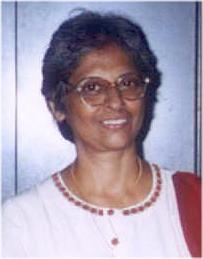The Independent Newsweekly
| National
Catholic Reporter
The Independent Newsweekly |
| Global Perspective |
| February 13, 2004 |
Vol. 1, No. 44
|

Janina Gomes is a freelance writer and works for chambers of commerce and other business organizations. She also contributes regularly to the "Speaking Tree", a column of philosophy and religion in the national daily, The Times of India. "People from this slum realized that we were neither pro-Hindu nor pro-Muslim nor pro-Christian but pro-humanity."
Patsy Khan, |
Enjoying the fruits of hope and courageBy Janina Gomes MUMBAI, India -- Christianity is an incarnational religion, and if Christ were walking this earth today, he would be working among the poor and marginalized of the world. No one believes this more than Patsy Khan from the Daughters of the Heart of Mary, a religious congregation that runs what has been rated as a five-star institute called the Nirmala Niketan College of Social Work. A group of religious from her congregation has lived and worked in a slum between the suburbs of Bandra and Khar since 1969. Patsy was one of the pioneers establishing this ministry. The slum covers an area of about a square kilometer and has some 50,000 inhabitants today. Part of the area originally was owned by the "Kolis" or fisherfolk. They sublet portions of the land, which attracted homeless migrants flocking to Mumbai. Patsy describes the slum as a microcosm of India: Hindus, Muslims and a few Christians live cheek by jowl. An important part of her Christian witness in a multicultural and pluralistic religious society like India has been serving people from all communities in the slum, irrespective of caste, creed or religion. "People from this slum realized that we were neither pro-Hindu nor pro-Muslim nor pro-Christian but pro-humanity," she says. During communal riots in 1992, the strength of this interreligious harmony stood the test: The slum was almost unscathed. Patsy says the sisters' work has grown organically over the years. They started with charity, like distributing food and meeting basic needs, but gradually their activities shifted to building human capabilities and empowering people. After initially building rapport with the people, they started a day care center for mothers to leave their children while they were away at work. This center became an entry point for future activities, such as gathering the women together for monthly meetings. From these meetings, the women themselves initiated campaigns to tackle social problems in the slums, such as child marriage, domestic violence and alcohol abuse. Conscientizing the slum dwellers on their rights became an integral part of the program. For instance, new slum dwellers who were paying high rent to earlier immigrants who had no right to collect rent were made aware that they were being duped. Naturally, this created many enemies for the social workers, especially among the slumlords and other vested interests. An important feature of the sisters' work has been activities for the youth, many of whom are first in their families to receive any formal education. Through the youth, the work of consicentization continues, as well as the creation of an alternative grassroots leadership. Patsy has found her Christian witness challenging and inspiring. Living with all the noise and the dirt in a slum was not easy. Neither was being on call day and night. But she considers herself privileged to have witnessed to Jesus in serving the poor and the marginalized. The sisters have discovered, Patsy said, that the spirit of service is also strong in the people, Hindus and Christians, who have volunteered their time in the projects. She cites, as an example, doctors who provided health services in the slum's clinic during hours when they normally would have been resting. Providing such volunteer opportunities is another part of Christian witness, Patsy said. Making it possible for middle-class people to work with slum dwellers builds bridges between the "haves" and the "have-nots." Patsy says living among the people, sharing their joys and sorrows, hopes and anguish has become part of her spirituality. It is a road to God and a witness to a society that often ignores the needs of the poor and the marginalized. Gracy Fernandes was another pioneer from the Daughters of the Heart of Mary during the early days in the slums. She said the scripture passage "I have seen the plight of my people and I send you among them" inspired her and gave meaning to her work with the people of Khar Danda. "I felt close to their lives and struggles, their joys and celebrations," Gracy said. "I tried to live the social significance of my religious life in the challenging situation faced by the poor." Empowered by a sense of direction and the knowledge that they already possessed the necessary resources within themselves, the people in the slums began to change their lives and living conditions, she said. "Today, they are enjoying the fruits of their hope and courage." Magdalene David Almeida, now a local superior in the Daughters of the Heart of Mary, says she felt privileged by her time living in the slums. "I met all kinds of people, mostly the poor from the slums around us, and women in particular. The challenging, insecure life they live in the slums -- very often caring for the family single handedly -- is something to be admired. At times I wonder where they get the strength from … I have learnt many things from them. "Their presence in my life helps me go beyond myself and motivates me to do something for their empowerment," she said. |
| Copyright
© 2003 The National Catholic Reporter Publishing Company, 115
E. Armour Blvd., Kansas City, MO 64111
TEL: 1-816-531-0538 FAX: 1-816-968-2280 |